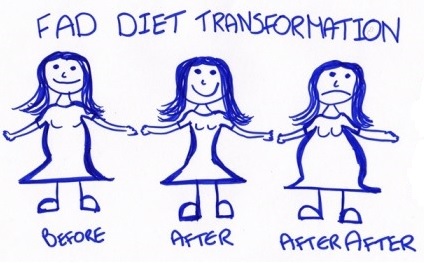FAD Diets: Know the Facts
Maintaining a healthy weight, especially when trying to lose some, can be really challenging. At this age of instant gratification, it seems that losing weight is one of the many things that people would want to achieve faster and easier. And with this need of a quick fix, various diets have continually emerged promising the same thing: Quick and easy weight loss. These are called fad diets.
Fad diet (also known as crash diet or diet cult) is “any dietary regimen or practice promoted for weight loss and improvement of health that does not form part of standard dietetic-led weight management advice.” This type of diet is generally extreme and shady in nature and could even be detrimental to one’s health1. These diets comprise a very restrictive eating plan with few or unusual combination of foods for a short period of time and often make claims for quick drastic weight loss2
Here are the 7 classifications of fad diet and its examples as cited in the National Nutrition Council’s Policy statement on Fad diets:
|
Classification |
Examples |
|
Calorie Restriction |
Very Low Energy Diet (VLED), Military diet, Blood type/Cohen, HCG diet |
|
Low Carbohydrate, High Protein |
Atkin’s diet, Paleo diet |
|
Moderate Carbohydrate, High Protein |
Zone diet, South Beach Diet |
|
Low Carbohydrate, High Fat |
Ketogenic Diet |
|
Avoidance to certain food groups |
Gluten-Free, Macrobiotic Diet |
|
Fasting |
Intermittent Fasting, Water Fasting |
|
Detox |
Juice Fast, Master Cleanse |
These diets claim to be successful in the short-term due to the decrease in caloric intake and increase in physical activity. However, when a dieter goes back to his/her usual food intake, there is a greater possibility of weight gain (as shown in the photo below).

Following a short dietary regime is medically unsuitable and unsustainable with many dieters failing in their dietary adherence and long-term behavioral change. Some of the negative impacts of following these diets include:
- Short-term success, long-term failure. Restricted macronutrient consumption and exclusions of certain foods may be beneficial for a few highly motivated individuals in the brief period of time.
- Nutritionally imbalanced. Fad diets that limit certain food groups can cause nutrient deficiencies over time. These diets focus more on macronutrient composition rather than micronutrient intakes.
- Poor diet adherence and long-term behavior modification. Fad diets that limit certain food groups can cause nutrient deficiencies over time.
- Induce stress and cause disease to certain organs. Diets that encourage intake of certain nutrients (e.g. fat) can contribute to lifestyle diseases (e.g. atherosclerosis).
- Lack focus on the importance of health and physical activity. Fad diets rarely focus attention on energy expenditure through the promotion of increased physical activity. Fatigue caused by low energy and nutrient consumption may demotivate a dieter to exercise.
- Psychological Implications. There is increased perceived psychological stress when a person restricts his/her caloric intake (resulting to increased daily cortisol). When chronically elevated, cortisol can have deleterious effects on weight, immune function, and chronic disease risk.
Recommendations for a safe, healthy, and holistic dietary, exercise, and behavioral plan are key to long-term weight loss and improvement of overall health. Nutritionists recommend a healthy weight loss of 1-2 pounds per week as drastic weight loss can never be good for your body. Firstly, you may be losing just water weight and muscle mass, not the fat. Secondly, you may just regain all those lost weight as quickly as you have lost them and then maybe gain even more because of deprivation. Thirdly, subjecting yourself to starvation may destroy your metabolism altogether. That’s why there are some people who complain of getting fat even when they don’t eat anymore.
Losing weight need not be a horrible experience. Who says healthy eating can’t be indulging? Maybe you haven’t tried Gardenia Pineapple Spinach Roll Ups using our High Fiber Whole Wheat Bread, made from 100% real premium wholemeal flour which is high in fiber, plus vitamins and minerals such as vitamin B1, Calcium, and Iron. Two slices provide 20% of your daily fiber needs and a perfect snack to kick-start your healthy weight loss journey.
Gardenia Pineapple Spinach Roll Ups

Ingredients:
2 slices Gardenia High Fiber Whole Wheat Bread
¼ cup Boiled Spinach (50 g)
½ cup Cream Cheese (1/2 bar)
Salt and pepper to taste
Pineapple tidbids (50 g)
PROCEDURE
1.) In a bowl, combine cream cheese and spinach then season with salt and pepper and mix well.
2.) Trim the sides of the bread and flatten it using a rolling pin.
3.) Spread 1 tbsp of the cream cheese mixture onto the bread.
4.) Place the 25 g of pineapple tidbids on top of the mixture and roll it.
5.) Slice it in half before serving.
Generally, weight loss requires an individualized and interdisciplinary approach. This is also a combination of consumption of healthy diet, physical activity, and behavior modification. Aiming for a sustainable diet and healthy lifestyle in general is way better than just aiming to lose weight. Losing weight may require time but always remember that slow and steady, wins the race!
References:
Hankey, C (2018). Advanced nutrition and dietetics in obesity. Hoboken, NU: Wiley.
National Nutrition Council (2018). Policy Statement on Fad diets. Retrieved from https://www.nnc.gov.ph/phocadownloadpap/userupload/nnc-car/NNC%20GB%20%20Res%20fad%20diets.pdf